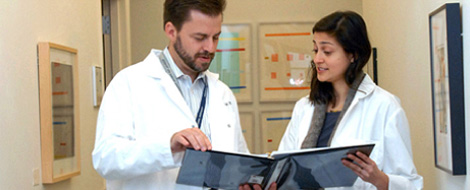Clinical Trials Overview
Clinical Trials

If you are interested in joining a study or want to learn more about our research, please browse our studies.
Getting Started in Research

Learn more about types of research and the steps involved in initiating a clinical trial at SUNY Downstate.
Overview
SUNY Downstate Health Sciences University is committed to finding new ways to prevent and treat disease in people, and these efforts involve a form of research called clinical trials. Clinical trials aim to discover new drugs, surgical procedures, radiologic procedures, devices, behavioral treatments, process-of-care changes, preventive care, etc.
Clinical trials are the principal mechanism by which new information is brought to the clinic in order to improve patient care. When a physician or other health care provider meets with a patient and their family to review treatment options and plan out a management strategy, the discussion is guided by data generated from clinical research studies. Advancing clinical research is essential to the missions of SUNY Downstate Health Sciences University.
After a proposed treatment, drug therapy or device is found to be helpful and safe in pre-clinical studies in laboratories, it must also prove to be safe and effective in humans. This evaluation period is known as a clinical trial. A clinical trial also can study human behavior.
As only academic medical center in Brooklyn, research investigators at SUNY Downstate is leading or participating in a large number of clinical trials. This website provides information regarding trials associated with faculty members who are part of Downstate's Clinical and Translational Science Center (CTSC).
While clinical trials are considered the fastest way to determine if a proposed intervention is safe and effective, they include both potential benefits and risks. A trial participant has the chance to receive a potentially promising treatment that is not available to the general public and to receive care at the nation's top academic medical centers and research institutes. Broad and diverse participation in a clinical trial also ensures that the treatment, drug or device will be effective for everyone, not just a segment of the population.
However, those participating in clinical trials face the chance that their disease or condition will not improve with the experimental treatment, and they could experience adverse side effects, among other possible drawbacks.
What is most important for patients is knowledge about and access to clinical trials, so they have the opportunity to participate if they choose and can make informed decisions about their health.
Rules on Approval and Adherence
The details of a clinical trial, including all tests and procedures used in the trial, are outlined in a research plan, usually called a protocol. Before a clinical trial can begin, the protocol must be approved by Downstate's Institutional Review Board (IRB).
After a clinical trial is approved by the IRB, a Downstate team of researchers, clinicians and other patient care specialists oversees the trial and all interactions with the research volunteers. This team follows strict rules set forth by the U.S. Food and Drug Administration and other government agencies regarding clinical trial processes. The rules ensure that people who participate in clinical trials are treated as safely as possible.
A clinical trial is paid for by the organization that sponsors the research, which may be a drug or medical device company, as well as by private foundations, faculty members on the trial team or the departments of the Downstate faculty members.
Who conducts the clinical trials?
Clinical studies are usually sponsored by government health agencies, pharmaceutical companies, academic and medical centers, national organizations, doctors and health care providers. Every study is led by a principal investigator and a research team that includes doctors, nurses, social workers, and other clinical research professionals.
Will I find a cure for my problem?
Some clinical trials might be successful, some might not be. We wish we could promise a cure for every illness, but this is yet impossible. If you are considering participating in a clinical trial, to find the best study for you and see if you are eligible, we strongly suggest that you first consult with your healthcare provider.